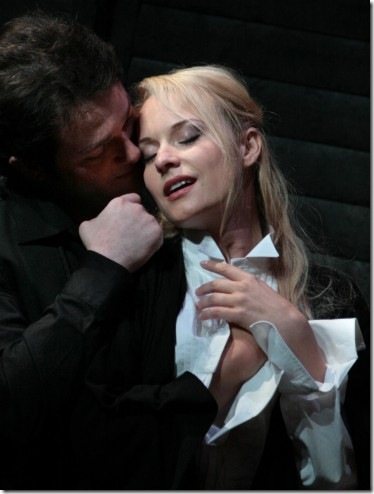For its first staged production of the season, the Palm Beach Opera on Friday presented a decent, if unremarkable, production of what is often considered Giuseppe Verdi’s finest opera.
Otello, which for the composer marked a bold advance toward a seamless fusion of music and drama, requires a kind of singing and acting that it only got intermittently on the Dreyfoos Hall stage at the Kravis Center. Nevertheless, it was a good night at the theater overall, and a refreshing, brainy way to get the staged season under way.
The American tenor Carl Tanner was the Moor who loved not wisely but too well, and at his best Friday night, he sang with an appealing lyric sound. It’s a pretty voice, very Italianate, and doubtless delightful to listen to in lighter repertoire. Here, though, a more heroic, heavier voice is needed; one missed the weight that would make the words la gloria, il paradiso ring out in the Act I love duet, for example.
Tanner’s acting was also hit-or-miss. Much of the time he seemed to be uncomfortable moving around on stage, rather than dominating it, as the tough guy who just whipped the Turks would be expected to do. But as his voice warmed up, his acting got more natural, and he became more persuasive as a man driven into a jealous rage, gasping out, rather than singing, the first measures of Dio! mi potevi in Act III.
As Desdemona, the Slovenian soprano Sabina Cvilak offered a strong, rather dark voice with a wide vibrato in the upper reaches. She sang noticeably flat in her first couple entrances, but by the third act, her voice had risen to the occasion, filling out and blossoming as the drama turned to center on her.
The true test of any Desdemona is the fourth act, with some of the most beautiful pages in any opera, and here Cvilak won the only solo applause of the night. She was quite effective in the Willow Song and Ave Maria, singing the repeated Salce, salce, salce nearly inaudibly but most compellingly, and she was able to move from there to her farewell outburst to Emilia with convincing power.
As a couple, Cvilak and Tanner had no chemistry whatever, which isn’t fatal to the success of the opera, but it would have helped sell the lackluster singing of the Act I love duet and the swift emotional changes of the Dio ti giocondi set piece in Act III, not to mention the very end of the opera.
The most consistent singing, and best acting, came from the American baritone Tom Fox as Iago. He sang well throughout the opera, seizing the listener’s attention from the very start with a bronze-like sound of real quality and presence. The top three or four notes of his range were missing, but Fox covered for them, snapping off the high yelp of the Act I drinking song, for instance, rather than belting it out. That drinking song had a nice touch as well, as orchestra and Fox did a fade on the falling phrase of the refrain, evidence of a sophisticated, canny musicianship.
Fox’s acting was that of a confident, thoroughly professional performer, at home in the spotlight, and he imbued his character not just with the requisite menace but a kind of manly force that made it easier to see why his transparent stratagems worked so well.
The young American tenor Norman Shankle was an adequate Cassio, with a somewhat lightweight voice that showed its very attractive coloring to best effect in the handkerchief exchange with Iago in Act III. He, too, is a singer who would be good to hear again in lyric romantic roles. Mezzo-soprano Irene Roberts, a member of the Palm Beach Opera’s Young Artist program, sang respectably as Emilia, with a voice of good size and roundness.
Perhaps best of all in this Otello was the orchestra, which save for one flubbed horn cue at the end of Act I, played beautifully in a score that calls for the ensemble to supply most of the psychological underpinnings as well as the accompaniment. Bruno Aprea conducted them with his usual excellence, engagement and passion, unleashing all their strength in the big choral scenes and bringing surpassing tenderness and delicacy to the Willow Song. Only a slightly slower tempo in that Act IV scene might have helped make it more poignant.
This is a handsome Otello, with evocative sets from Allen Charles Klein and traditional late medieval-early Renaissance costumes in a multiplicity of colors. Veteran French director Bernard Uzan makes good use of his stage, keeping the action from bunching up or getting static.
The chorus was not particularly good at the outset, shaky and off cue in their outbursts during the storm, and the male voices were weak. The women, however, sang nicely in the Act II song for Desdemona, and the massed ensemble singing in Act III was properly forceful.
What this performance lacked most was a sense of furious forward motion, a feeling of events spinning out of control. Part of that has to do with casting the wrong kind of tenor voice for Otello, and part of it Friday night probably had to do with opening-night unfamiliarity. But it has to have that kind of drive to make the denouement work — in Shakespeare as well as Verdi.
Otello will be performed at 7: 30 p.m. today at the Kravis Center with tenor Allan Glassman as Otello, soprano Michele Capalbo as Dedesmona, and baritone Daniel Sutin as Iago. Friday night’s cast returns for a second performance at 2 p.m. Sunday, and tonight’s cast returns at 2 p.m. Monday. Tickets: $23-$175. Call 1-800-572-8471 or visit www.pbopera.org.
